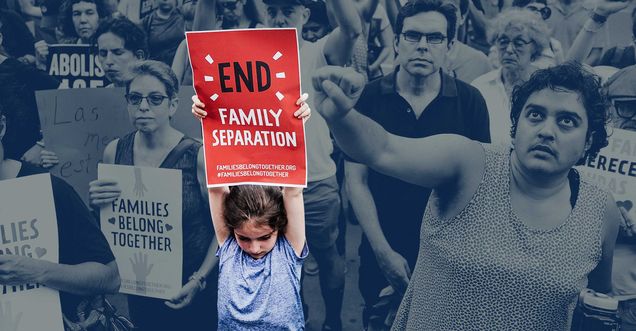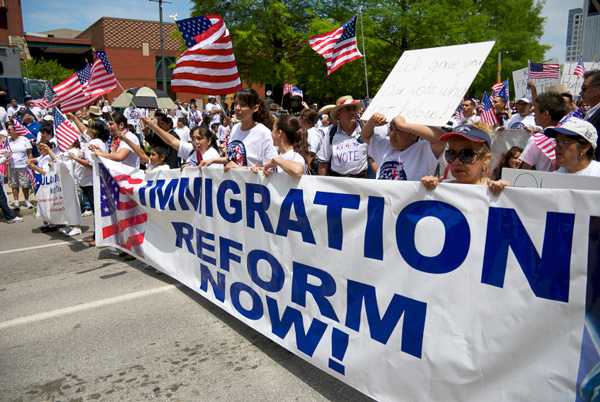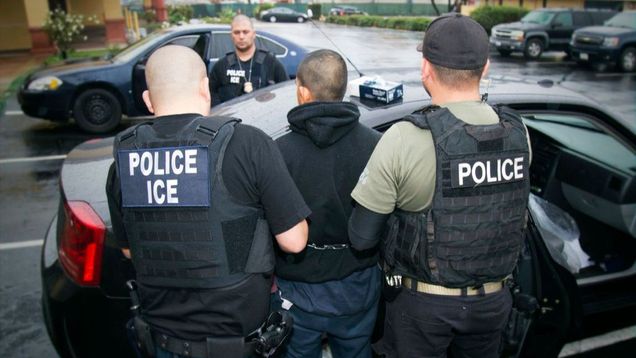Tagged: Immigration and Customs Enforcement
The US House Must Start Protecting Undocumented Minors
The 2018 midterm election should be considered less of a “blue wave” and more of a call to action made by the people of the United States to their House Representatives. The Trump administration has made many an egregious decision since 2017 and the Democrats of both the House and the Senate have unable to block such decisions due to their minority status. The Democrats must use their majority status in the House to actively combat the Trump administrations treatment of Latin American and other undocumented minors in detention.
Beginning in April 2018, Trump’s “zero tolerance” immigration policy led to the separation of infants from their mother’s arms, children from their father’s reach, and siblings from their brother’s or sister’s hands. Family separation shocked the conscience of the nation and the outcry against the policy’s ramifications drove President Trump to sign an executive order “ending” family separation. Thousands of children remained in detention, separated from their parents, for months after the executive order. In June 2018, a U.S. District Court Judge issued a preliminary injunction against the government, requiring that children be returned to their parents within 30 days. Come late October, the Department of Homeland Security still had hundreds of separated children in its custody. The government’s failure to comply with the injunction filled public discourse with calls to act to free the children. Some of the parents of these children who have been deported to the countries they fled have made the soul-churning decision to leave their children in the United States because returning the children to their country of origin could mean death. Despite the alleged “end” of the family separation policy, 81 children have been separated from their families since President Trump’s executive order.
children from their father’s reach, and siblings from their brother’s or sister’s hands. Family separation shocked the conscience of the nation and the outcry against the policy’s ramifications drove President Trump to sign an executive order “ending” family separation. Thousands of children remained in detention, separated from their parents, for months after the executive order. In June 2018, a U.S. District Court Judge issued a preliminary injunction against the government, requiring that children be returned to their parents within 30 days. Come late October, the Department of Homeland Security still had hundreds of separated children in its custody. The government’s failure to comply with the injunction filled public discourse with calls to act to free the children. Some of the parents of these children who have been deported to the countries they fled have made the soul-churning decision to leave their children in the United States because returning the children to their country of origin could mean death. Despite the alleged “end” of the family separation policy, 81 children have been separated from their families since President Trump’s executive order.
Another source of turmoil within the United States’ immigration system is the lack of representation for these children. Children, who do not speak English and are as young as 3 years old, are representing themselves against the U.S. government in immigration courts. They are being led to make decisions that are not in their best interest. For example, a 5 year old girl named Helen was told to sign her name on a form that waived away her rights to a Flores bond hearing, which would have guaranteed her a hearing in front of an immigration judge in far less time than she spent at a shelter, separated from her family. While organizations like the American Civil Liberties Union, private firms, and law school institutions are providing legal services to help bring families back together, the number of children essentially being forced to represent themselves is too high.
 The psychological toll on the detained children who were reunited with their families is immeasurable. There have been documented cases of young children, unable to understand why their parents suddenly disappeared from their lives, rejecting or distrusting their parents upon reunification. Other children live in fear of being taken again and anxiously cling to their parents. In December 2018, the nation took notice of the deaths of two undocumented children, one a 7 year old girl and the other an 8 year old boy, both from Guatemala, who died from medical complications while in Border Patrol custody.
The psychological toll on the detained children who were reunited with their families is immeasurable. There have been documented cases of young children, unable to understand why their parents suddenly disappeared from their lives, rejecting or distrusting their parents upon reunification. Other children live in fear of being taken again and anxiously cling to their parents. In December 2018, the nation took notice of the deaths of two undocumented children, one a 7 year old girl and the other an 8 year old boy, both from Guatemala, who died from medical complications while in Border Patrol custody.
More and more questions are being raised in Congress about how to address the turmoil of the Trump administration’s immigration landscape. Despite increased attention on this humanitarian crisis at the border, the problem has gotten worse over the past few months. In fact, Boston University Law Professor Sarah Sherman-Stokes reports that a team of BU Law professors and students spent a week at the border in March. They used sharpie markers to write parents’ contact information on their children in case they were separated. Despite this, the Trump White House seems to be now moving toward an even harder line toward migrants; complete with a purge of Homeland Security leadership.
At this point, there should be no compromise by Democrats regarding the treatment of undocumented children and their families. Now that Democrats have a deciding vote in the House, they must use that vote, the voice their constituents gave them–and especially their oversight powers–to protect the voiceless and vulnerable children in DHS custody.
This may be finally happening. On April 17th, Elijah Cummings (D-Md.), chair of the House Oversight Committee, invited the architect of Trump’s immigration policy Stephen Miller to appear before the Committee:
“I am offering you an opportunity to make your case to the Committee and the American people about why you — and presumably President Trump — believe it is good policy for the Trump Administration to take the actions it has, including intentionally separating immigrant children from their parents at the border to deter them from coming to the United States, transferring asylum seekers to sanctuary cities as a form of illegal retribution against your political adversaries, and firing top Administration officials who refuse orders to violate the law.”
Miller is scheduled to appear before the Oversight Committee on May 1.
The safety of children should not be a partisan issue, but if anyone is going to act to ensure the safety of immigrant children, it should be the newly elected House of Representatives. The House should pressure the Senate and President to abide by the United Nation’s guidelines on the humane treatment of migrant children and their families and enforce their implementation. Any derogation leaves room for more horrifying tales of assault, abuse, trauma, and deaths of innocent children who were only trying to avoid such fates in their homelands. The House should also legislate to protect the Flores rights of unaccompanied minors and require that these minors be provided with representation in front of immigration courts.
The international community has condemned President Trump’s treatment of migrants, documented and undocumented, asylum-seeking and non-asylum-seeking, on several occasions, but some of the loudest condemnations fall upon the separation of families and treatment of children. Some governments and organizations have gone so far to call the family separation policy a humanitarian crisis and illegal. Let this moment in our nation’s history not go down as a complete humanitarian failure but as a showing of what the people can do to try and rectify the mistakes made by discriminatory policymaking.
 Cassandra Castro will graduate from Boston University School of Law in 2020.
Cassandra Castro will graduate from Boston University School of Law in 2020.
What are the Merits of a Merit-Based Immigration System?
In early November 2017, a man drove a truck onto a bike path in New York, killing eight and injuring thirteen. The suspect was a lawful permanent resident who received his immigrant visa through the diversity lottery program. This program allocates fifty thousand immigrant visas for foreign nationals from “countries with historically low rates of immigration to the United States.” Just a month later, in early December 2017, another man attempted a terrorist attack in New York using a homemade pipe bomb, injuring five. This suspect also was a lawful permanent resident, but he received his immigrant visa through the family-based immigrant visa category that allows siblings of U.S. citizens to immigrate to the U.S. based on that relationship.
Although immigration has arguably never left the spotlight in recent years, these two events brought it to the forefront once again. More specifically, President Trump used both instances immediately as an example of why our immigration system needs an overhaul. The viewpoint of the President and many others is that these events indicate immigration must be reformed to permit fewer routes to lawfully immigration into the United States. President Trump’s plan is to limit family-based immigration to only spouses and minor children of U.S. citizens (it now includes extended family like siblings or parents of U.S. citizens) and to introduce a points-based immigration system to “protect U.S. workers and taxpayers.” To do so, he has thrown his support behind the RAISE Act (House bill 3775 and Senate bill 1720) two substantially similar bills that seek to “establish a skills-based immigration points system, to focus family-sponsored immigration on spouses and minor children, to eliminate the Diversity Visa Program, [and] to set a limit on the number of refugees admitted annually to the United States.” Neither version of the bill has left committee. Currently, foreign nationals can immigrate to the U.S. through the diversity lottery program, through family sponsorship, through employment sponsorship, or as a refuges or asylum seeker.
The proposed skills-based program is not the first of its kind. Canada was the first country to introduce a points-based system, with Australia and the United Kingdom following. Generally, these programs allocate points for certain attributes, such as age, education, and English-speaking ability. The United States program would allocate points based on age, level of higher education, English ability, job offer, and “extraordinary achievements.” Higher points are granted for applicants who are in their late 20s (i.e. of prime working age), who have earned a graduate or professional degree, who speak English fluently, and who have a high salaried position offered to them. Extraordinary achievements, like Nobel prizes or Olympic medals, offer additional points. Furthermore, points can be allocated for significant investment in the U.S., a revised version of the “EB-5” employment based category, which currently applies to foreign nationals that have invested $1 million in the U.S. Under the RAISE system, about 2% of Americans would qualify for an immigrant visa.
 Professors Ayelet Shachar and Ran Hirschl argue that “[p]icking winners, in this context, comes very close to resembling headhunting practices, turning immigration officials and other policymakers, as well as public and private actors with devolved authority, into enterprising recruiters of super talent.” (at 87) These merit-based programs ultimately “prioritize brains, talent, and special skills.” (at 100) Immigration attorneys Chris Gafner and Stephen Yale-Loehr argue that “the point lottery should be a meritocracy based upon each applicant’s ability to contribute to the national interest. (at 210, emphasis added) They argue it would provide a more objective basis for adjudication of immigrant visa applications, “ensur[ing] that qualifying immigrants have the tangible qualities and knowledge that will truly enhance U.S. interests.” (at 208) The argument for merit-based immigration is that it supports national interests by attracting foreign nationals that are more likely to contribute to the U.S.
Professors Ayelet Shachar and Ran Hirschl argue that “[p]icking winners, in this context, comes very close to resembling headhunting practices, turning immigration officials and other policymakers, as well as public and private actors with devolved authority, into enterprising recruiters of super talent.” (at 87) These merit-based programs ultimately “prioritize brains, talent, and special skills.” (at 100) Immigration attorneys Chris Gafner and Stephen Yale-Loehr argue that “the point lottery should be a meritocracy based upon each applicant’s ability to contribute to the national interest. (at 210, emphasis added) They argue it would provide a more objective basis for adjudication of immigrant visa applications, “ensur[ing] that qualifying immigrants have the tangible qualities and knowledge that will truly enhance U.S. interests.” (at 208) The argument for merit-based immigration is that it supports national interests by attracting foreign nationals that are more likely to contribute to the U.S.
However, the points-based system is not without its criticisms. First, there are human rights concerns. Specifically, this system restricts freedom of movement and discriminates against large classes of foreign nationals, both of which are designated as human rights under international law. (at 286) Second, this restricts the movement of human capital by limiting the number of foreign nationals who can lawfully immigrate (or even enter) the U.S., which is not necessarily a sound economic policy. (at 289) Finally, it is not entirely clear that these systems have been effective in those countries in which it has been implemented. For instance, the Canadian program has become notorious for extremely long waiting times and for underutilizing the highly skilled foreign nationals it attracted. In the UK, businesses have asked for special treatment or exceptions because of the need for foreign workers that would not otherwise qualify under the point system. Thus, despite its lofty goals, the RAISE Act is not without flaws.
This bill lacks support in Congress. Additionally, Trump has been criticized for the timing of his support for RAISE: “Trump's immediate labeling of the attack as a terrorist act and his calls for policy actions contrasted with his responses to the violence and a killing by white supremacists in Charlottesville, Va., in August — Trump wouldn't blame the neo-Nazis solely and said then he doesn't rush to discuss incidents without the facts — and to the mass killings in Las Vegas on Oct. 1, after which he said it was too soon to discuss gun laws.”
Furthermore, this is not the only route to immigration reform. In the House, the Fairness for High-Skilled Immigrants Act offers an expanded immigration system. This bill eliminates per-country numerical limitations for employment-based visas. To immigrate through employment sponsorship, the current system allocates a limited number of visas based on the foreign nationals’ country, with a significant backlog for foreign nationals from certain countries, namely India, China, and the Philippines. This could leave foreign nationals waiting to up to ten years to complete the immigration process. For example, certain Indian nationals who began the immigration process in 2006 are still waiting for visas to be available. By eliminating the per-country numerical limitations, those Indian nationals would finally be able to receive lawful permanent resident status in the United States. This bill also increases the numerical limitations set for family-based immigrant visas. Like RAISE, this bill is still stuck in committee.
Neither bill seems to be garnering much attention, even with the President’s support for RAISE. There is an irony in the nation of immigrants trying to significantly restrict immigration. Of course, the issue is not as simple as turning away immigrants. However, at its core, that seems to be what RAISE is doing. The Fairness for High-Skilled Immigrants Act may not solve the problem either. It could be more of a temporary fix than a permanent solution or it could introduce different issues. Overall, neither bill seems to satisfy the need for immigration reform. They both propose reform while lacking a resolution to the controversial issue that prevails in the public eye.
 Nancy Williams anticipates graduating from Boston University School of Law in May 2019.
Nancy Williams anticipates graduating from Boston University School of Law in May 2019.
“Am I Free to Go?” – It Depends On Who You Ask
Typically, when criminal proceedings against a person in state or local custody have been settled, he or she is free to go. This can occur either after that the individual's charges have been dismissed, they have posted bail, or their jail sentence has been completed. Yet, for years there has been confusion among states whether exceptions to this process can be made for certain immigrants. The confusion focuses on whether or not state or local law enforcement officials have the authority to detain an immigrant based solely on a request, or detainer, from Immigration and Customs Enforcement (ICE). In other words, is an immigrant free to go once the criminal proceedings have been settled, or do these ICE detainer requests carry some legal weight? The answer to that question changes depending on who you ask.
The Supreme Judicial Court of Massachusetts was recently confronted with this question and on July 24, 2017 it issued a ruling in Commonwealth v. Lunn limiting the ability for state and local law enforcement officials to assist with federal immigration enforcement. To help address the issue, the court proceeded to “look to the long-standing common law of the Commonwealth and to the statutes enacted by our Legislature.” Ultimately, the court concluded that “nothing in the statutes or common law of Massachusetts authorizes court officers to make a civil arrest in these circumstances.” It was this language that presumably opened the door to recent legislation that was filed by Governor Baker August 1, 2017.
According to Governor Baker, this bill “fills the statutory gap identified by the SJC” and “authorizes, but does not require, state and local law enforcement to honor detention requests from Immigration and Customs Enforcement for aliens who pose a threat to public safety.” It attempts to accomplishes this mission, and avoid running up against the holding in Lunn, by narrowing the scope of the legislation. The bill is supposed to establish minimum criteria for an immigrant to be deemed a public safety threat by focusing “on those who have been convicted of serious crimes such as murder, rape, domestic violence and narcotics or human trafficking.” Furthermore, any detention in excess of 12 hours that results from compliance with a detainer request or an administrative warrant would be subject to judicial review. On its face, this bill seems to pass muster with the holding in Lunn and attempts to strike a healthy balance between public safety and immigrant rights, but there are some serious legal and moral issues that this bill either misguidedly collides with or willfully ignores.
First and foremost, the bill does not target only people convicted for atrocious crimes, despite claims to that effect. Under the bills current language, an immigrant can be detained by state or local officials for immigration purposes, if he or she “has engaged in or is suspected of terrorism or espionage, or otherwise poses a danger to national security [emphasis added].” These standards clearly fall short of a conviction. It also allows for detention in cases where “the person has been convicted of an offense of which an element was active participation in a criminal street gang, as defined in 18 U.S.C. § 521(a).” Unfortunately, the methods that many state and local police officials use to identify gang membership, have come under much scrutiny because of their unreliability, lack of transparency, and minimal oversight. In Boston, something as simple as the color of an immigrant’s attire, or as ironic as being the victim of an attack by another gang, can lead police to label an immigrant a gang member. Furthermore, the bill states that a person who has been convicted of an aggravated felony, as defined under 8 U.S.C. § 1101(a)(43), can also be detained. Again, the use of said language can be very misleading and troubling. For the purposes of federal immigration law, Congress has broad latitude to label crimes as aggravated felonies and an offense need not be “aggravated” or a “felony” to be considered an aggravated felony (see 8 USC § 1101(a)(43)). As the ACLU of Massachusetts and the Massachusetts Immigrant and Refugee Advocacy Coalition recently stated in a joint memo, “the premise that any legislation authorizing warrantless detention of immigrants is necessary for public safety is misguided.” Our current laws already provide communities with the necessary tools to take custody of people who pose a danger to public safety and local officials already have procedures for notifying ICE about current detainees.
Equally important to the determination of whether this is a well-crafted and well thought out piece of legislation, is the constitutional analysis of the bill. Importantly, a footnote in the Lunn decision noted that the court “do[es] not address whether such an arrest, if authorized, would be permissible under the United States Constitution or the Massachusetts Declaration of Rights.” And although the court chose “to defer to the Legislature to establish and carefully define” the authority for court officers to arrest for federal civil immigration offenses, it emphasized in an additional footnote that it expressed “no view on the constitutionality of any such statute.” Governor Baker’s bill tries to take advantage of this unanswered question, but unfortunately it would invite costly and unnecessary litigation about its constitutionality if it passes; litigation that would almost certainly hold ICE detainers as unlawful. First, Article 14 of the Massachusetts Declaration of Rights prohibits warrantless arrests for civil infractions. Second, in the case Morales v. Chadbourne the First Circuit court of appeals ruled that detaining a person based solely on an ICE detainer request is a violation of their Fourth Amendment right. The court explained that "[t]o hold otherwise would mean that the approximately 17 million foreign-born United States citizens could automatically be subject to detention and deprivation of their liberty rights."
Although everyone wants to live in a safe community, this bill promotes the false narrative that immigrants are associated with criminality, while further entangling state and local law enforcement in federal immigration enforcement. In the long run, bills such as this one can be dangerous to the administration of justice and to public safety. Although most people would agree that our federal immigration system is broken, states should be careful to protect the civil rights of all its residents.
Mario Paredes anticipates graduating from Boston University School of Law in May 2018.


